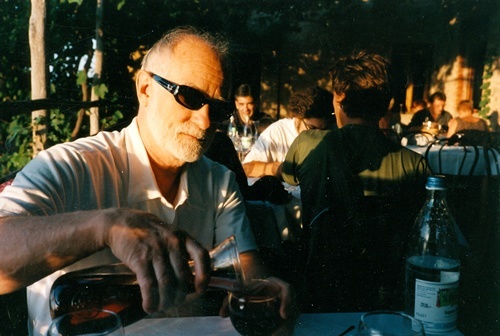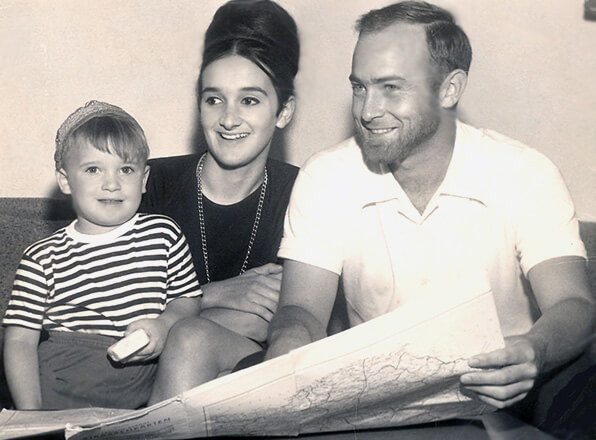Transitions Abroad Thirty Years On
The magazine
founder and publisher offers his perspective on how travel
and travelers have changed over the past three decades
by Clay
Hubbs. Ph.D.

|
|
Founding publisher and editor
Clay Hubbs enjoying some local wine at the pergola cafe
at his adopted hilltop village in Tuscany.
|
In 1977 I introduced the first issue
of Transitions Abroad magazine by describing
our intended readers as “non-touring travelers” for
whom learning — about the world and about themselves — was
the principal reason for going abroad.
In the same issue Gary Langer, then
a student at the Univ. of New Hampshire, wrote about his
stay at the Jerusalem guesthouse of an eccentric Armenian.
Only travelers stay at Mr. A’s, wrote Langer; tourists
do not.
“The distinction is simple:
Tourists are those who bring their homes with them wherever
they go and apply them to whatever they see. . . . Travelers
left home at home at home, bringing only themselves and
a desire to see and hear and feel and take in and grow
and learn.”
Since that time the traveler/tourist
distinction has become something of a cliché,
one that taken literally makes no sense. Outside our
own country we are all seen as tourists; even we use
the word tourist to describe the “other guy.” What
distinguishes one tourist from another is how we travel,
not where or even why. What distinguishes Transitions
Abroad readers from the other guy is a desire to
learn from our hosts, openness to change, and a desire
to share life's pleasures.
The purpose of the magazine
was never to tell readers how to behave abroad but rather
to provide the detailed information they need to enable
them to meet people of other countries, to speak their
language, to immerse themselves in their culture, and
thereby to “transition” to a new level of
understanding and appreciation of our common humanity.
The title, “Transitions,” was meant to suggest
the changes in our perspective that result when we get
away from the tour bus and beyond the postcards.
London's Calling
A few weeks ago the phone rang in the
middle of the night. It was the BBC calling from
London. They wanted to interview me about a story that was
making the rounds on the Internet. Big U.S. companies, fearing
anti-U.S. backlash, were teaming up to offer advice on how
to improve the behavior of business travelers overseas.
At first I didn’t see the connection
between Transitions Abroad and the behavior of
business travelers. Then I saw that this was an extension
of the traveler/tourist distinction.
“We are broadly seen throughout
the world as an arrogant people, totally self-absorbed and
loud,” said Keith Reinhard, chairman emeritus of DDB
Worldwide Inc., who heads up the effort to combat anti-U.S.
sentiment abroad through a group called Business for Diplomatic
Action, Inc.
The producer of the BBC radio talk
show wanted me to talk about the “Ugly American” and
how the behavior and the image of Americans abroad has changed
over the past decades.
The "Ugly
American" Myth and Conundrum
I’ve traveled abroad at least
once a year since the 1950s and lived abroad for varying
lengths of time. From what I’ve seen I’m not
convinced that Americans’ behavior is any worse than
that of other nationalities. But because of our physical
isolation and poor public education we perhaps are more
naïve than the average European traveler. And in our
naiveté we may sometimes draw attention to ourselves.
The BBC reporter gave me a few hours
to think about my response before calling back. During that
time I reflected on how travel and travelers have changed
over the past half-century.
In the decade or so after the end of
World War II I saw the worst examples of “Ugly American” behavior.
America had won the war. Those Americans who stayed behind
to help in the rebuilding of a devastated European continent
often did not seem ready to give their hosts credit for
their help in bringing the war to an end and the price they
had paid in the process. Americans often behaved like conquering
heroes. “How much is that in real money?!” is
just one example of the arrogant and ignorant behavior I
witnessed.
The sixties revolution brought hoards
of young people (including me and my wife in 1963) on pilgrimages
to the East. We made our trip in a VW bus across North Africa
and the Middle East to India, following the path of Alexander
the Great. Rather than being arrogant, our generation was
awed by all the “culture” we found in Europe
and beyond. As my wife and I went deeper into the Arab world
we gradually realized how limited and distorted by cultural
bias our perception of the world had been. From a guard
at the abandoned site of Persepolis we learned that our
hero Alexander was remembered locally as a destroyer of
a great empire.

|
With his family in 1964 after
returning from years of adventures in
England, North Africa, the Middle East, and Europe.
|
The ‘70s and ‘80s were
marked by a boom in mass tourism and packaged tours. In
the mid-‘70s my family and I took an extended sabbatical
in the South of France. Every week I went to Monte Carlo
for a French lesson (while my already-fluent family ate
pastries underneath the window of my language lab).
After my classes we walked over to
the famous hotel-casino and got to know some of guests.
It turned out that many of them were there for a 1-week
gambling vacation. They were picked up at the Nice airport
and bussed to the hotel and at the end of the week bussed
back. Many never left the hotel, yet they boasted that they
had been abroad.
How to Best Disseminate Information?
I was convinced that the major reason
that so many people were traveling in groups was the lack
of easily available information on how to travel on their
own. During that same year we learned how hard it was to
find information on schools for our children, and, when
we decided we wanted to extend our stay by finding jobs,
how difficult it was to find information on overseas employment.
That was when I decided to start Transitions
Abroad. Our first task was to collect information
and evaluate it. What were the best resources (information
sources) for work, study, travel, and living abroad?
To do this I contacted the top authorities in the four
fields and asked them for their selections. This was
an ongoing task; we updated — and, with the help
of our contributing editors, continue to update — the
lists each year.
The next job was to make this information
available to as many people as possible who could use it.
Before the advent of the Internet this — like the compiling
and updating of the “Best of” lists — was
not easy. But largely by word of mouth more and more people
found us. And once we had a substantial readership, we had
our major source of contributors — our own subscribers.
Soon a large portion of each issue was devoted to “participant reports,” first-hand accounts of how individual readers
succeeded in finding the work, study, travel, or living
programs best suited to their needs — or, more frequently,
used the magazine’s resources to create them themselves.
To return to the traveler/tourist dichotomy:
the one thing that distinguishes Transitions travelers from
ordinary tourists is that they travel for a purpose other
than simply diversion or escape.
The Impact of 9/11
And to return to the question of how
the behavior and the perception of Americans abroad has
changed in recent years, it’s clear that the ugly
American label only reappeared after our country’s
invasion and occupation of Iraq. After 9/11 we saw a worldwide
expression of sympathy and support (“We are all Americans
now,” proclaimed France’s leading daily.). Americans
already abroad and students who flocked after them were
treated warmly.
But now all that has changed. For a
time anti-Americanism focused on government policies and
the world held Americans in higher esteem than America,
according to America
Against the World: How We Are Different and Why We Are Disliked (Andrew
Kohut and Bruce Stokes, Times Books, 2006). But now foreigners
are “increasingly equating the U.S. people and the
U.S. government.” According to polls conducted by
Kohut and Stokes, “the American people, as opposed
to some of their leaders, seek no converts to their ideology”;
we are not cultural imperialists. What we are guilty of,
write Kohut and Stokes, is indifference to global issues.
In general, Americans have “an inattentive self-centeredness
unmindful of their country’s deepening linkages with
other countries.”
Kohut’s and Stones’ assessment
is a dark one — one that I believe the readers of Transitions
Abroad do not share. Time and time again in our pages
readers describe not only the changes in their perception
of the world as a result of their travel but ways they have
become involved in making positive contributions to the
situations in which they found themselves — either through
volunteer work or direct financial contributions.
A Vision for a Positive Future
Kohut and Stokes measured the opinion
of Americans on the part of the rest of the world and the
attentiveness of Americans toward other countries at what
must be a low point for both. If their polls could project
into the future the picture would surely be quite different.
In the first place, that reservoir of good will toward Americans
(as opposed to our present government) is not gone. On this
side, a new generation of young people rushed to sign up
for study abroad as a result of 9/11 and the subsequent “war
on terror.” Even larger numbers are traveling on their
own. In the next 30 years I predict a remarkable transformation
in ordinary Americans’ engagement with the rest of
the world, partly in reaction to the present (2006) government’s
arrogance and willed ignorance.
Transitions Abroad will
continue to point the way toward positive change through
travel — not just change in individual perceptions
but putting what has been learned to use to make the
world a better place for all of us.
Dr.
Clay A. Hubbs was Transitions Abroad's
original founder, editor, and publisher.
|
